Have you ever felt like your body is constantly fighting itself? I’ve been there too. Inflammation, while a natural response to injury or infection, can become a silent enemy when it lingers. Chronic inflammation is linked to serious health issues like heart disease, arthritis, and even depression. The good news? We can take control through the choices we make every day.
Research shows that certain foods can help combat this issue. Berries, fatty fish, and olive oil are just a few examples of nutrient-packed options that support our health. These foods are rich in antioxidants and omega-3 fatty acids, which work to reduce inflammation naturally.
In this article, I’ll guide you through the science behind these choices and how they can transform your well-being. Together, we’ll explore how simple changes to your diet can make a big difference. Let’s start this journey toward better health today.
Key Takeaways
- Chronic inflammation is linked to major health risks like heart disease and arthritis.
- Certain foods, such as berries and fatty fish, can help reduce inflammation naturally.
- Whole foods rich in antioxidants and omega-3s are key to supporting your health.
- Simple dietary changes can have a significant impact on your overall well-being.
- This article will explore the science behind these food choices and their benefits.
Understanding Inflammation and Its Effects
Inflammation is a natural defense mechanism, but when it goes unchecked, it can wreak havoc on your health. It’s your body’s way of protecting itself from harm, like healing a cut or fighting off an infection. However, when this response lingers, it can lead to chronic issues that affect your overall well-being.
Good vs. Chronic Inflammation
Acute inflammation is your body’s immediate response to injury or illness. It’s short-term and essential for healing. Think of it as your body’s way of sending reinforcements to the affected area. On the other hand, chronic inflammation is a prolonged state that can silently damage tissues and organs over time. This type of inflammation is often linked to conditions like heart disease, diabetes, and even cancer.
Inflammation and Disease Risk
Research shows that chronic inflammation plays a significant role in increasing disease risk. Elevated levels of inflammatory markers, such as C-reactive protein (CRP), are often found in individuals with conditions like heart disease and diabetes. Factors like stress, lack of physical activity, and poor dietary choices can exacerbate this issue, making it harder for your body to recover.
For example, stress can activate pro-inflammatory pathways, while a sedentary lifestyle may contribute to oxidative stress. These factors create a cycle that keeps your body in a state of constant inflammation. The good news? Simple changes, like incorporating nutrient-rich foods into your diet, may help counteract these effects and support your health.
Why an Anti-inflammatory Diet Matters
Your plate holds the power to transform your well-being. What you choose to eat can either fuel chronic inflammation or help reduce it. An anti-inflammatory diet isn’t just a temporary fix—it’s a long-term strategy for better health.
🏃 Start Your Weight Loss Journey Now!
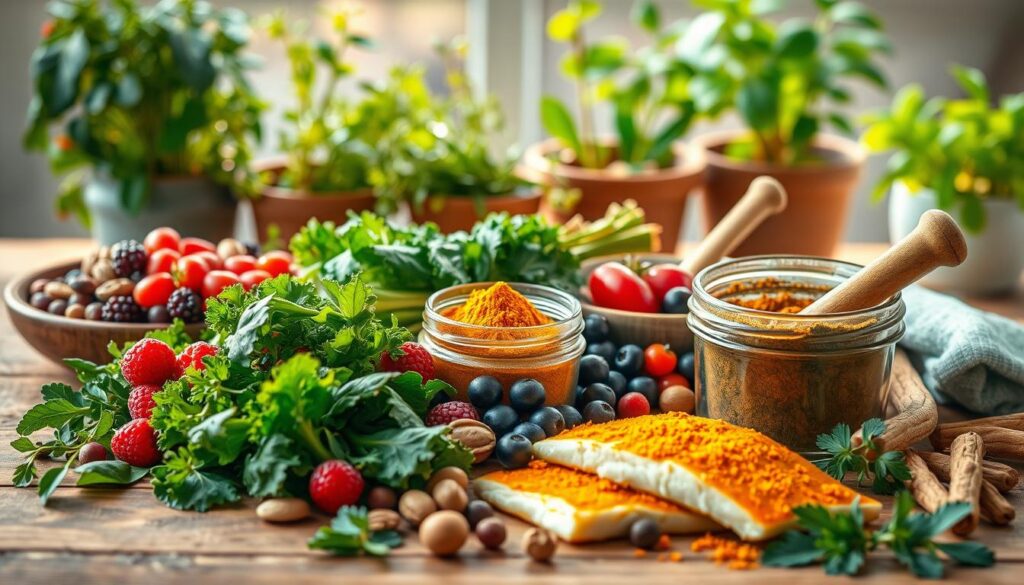
Long-term Health Benefits
Research shows that diets rich in fruits, vegetables, and healthy fats can lower chronic inflammation. This reduction may help prevent conditions like heart disease and diabetes. For example, studies highlight that the Mediterranean diet reduces C-reactive protein, a key inflammation marker, by 20%.
I’ve seen firsthand how small dietary changes can make a big difference. Gradually incorporating whole foods into your meals can support your body’s natural healing processes. These foods are packed with antioxidants and natural compounds that combat inflammation at its root.
Here’s a quick look at the benefits of an anti-inflammatory diet:
| Benefit | Impact |
|---|---|
| Reduced Disease Risk | Lowers chances of heart disease, diabetes, and metabolic syndrome. |
| Improved Gut Health | Supports a healthy gut, which is linked to reduced inflammation. |
| Enhanced Immune Function | Boosts immune health by reducing oxidative stress. |
| Better Quality of Life | Improves energy levels and overall well-being. |
Making these changes doesn’t have to be overwhelming. Start by adding more leafy greens, fatty fish, and olive oil to your meals. Over time, these choices can become habits that support your health for years to come.
Anti-inflammatory foods for diet
Choosing the right ingredients can be a game-changer for your health. What you eat plays a crucial role in how your body feels every day. Certain options, like extra virgin olive oil, berries, and fatty fish, are backed by research to decrease inflammatory markers and support a balanced diet.
These natural choices are packed with nutrients that help your body fight chronic inflammation. For example, fatty fish like salmon are rich in omega-3 fatty acids, which have been shown to lower C-reactive protein (CRP), a key marker of inflammation. Similarly, berries contain antioxidants that combat oxidative stress, reducing the risk of long-term health issues.
It’s important to choose foods in their natural state to maximize nutrient retention. Processed options often lose their beneficial properties and can even contribute to inflammation. By focusing on whole, unprocessed ingredients, you’re giving your body the tools it needs to thrive.
Here’s a quick guide to some of the best options to include in your meals:
| Food | Key Benefit |
|---|---|
| Extra Virgin Olive Oil | Rich in oleocanthal, which has anti-inflammatory effects. |
| Berries | High in antioxidants that reduce oxidative stress. |
| Fatty Fish | Contains omega-3s that lower CRP levels. |
| Leafy Greens | Packed with vitamins and minerals that support overall health. |
Incorporating these choices into your daily diet is a simple yet effective way to support your body’s natural defense mechanisms. Over time, these habits can lead to significant improvements in your overall well-being.
Top Anti-inflammatory Foods for a Healthier Life
The right choices on your plate can make a significant difference in how your body feels every day. Certain ingredients stand out for their ability to combat inflammation and support overall health. Let’s explore some of the best options to include in your meals.
Fresh Berries and Antioxidants
Berries like strawberries and blueberries are packed with anthocyanins, powerful antioxidants that help reduce oxidative stress. Studies show that these compounds can lower markers like C-reactive protein (CRP), which is linked to chronic inflammation.
Adding a handful of berries to your breakfast or snacks is an easy way to boost your antioxidant intake. They’re not only delicious but also support your body’s natural defense mechanisms.
🚀 Boost Your Metabolism & Lose Weight!
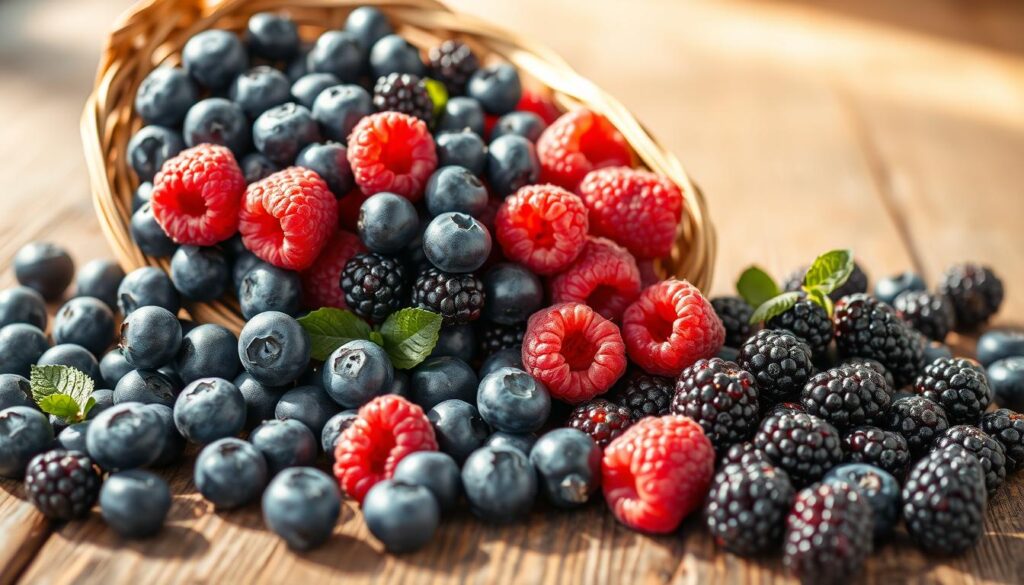
Fatty Fish and Omega-3 Benefits
Fish like salmon and mackerel are rich in omega-3 fatty acids, specifically EPA and DHA. These nutrients have been shown to reduce inflammatory markers such as CRP and interleukin-6.
Including fatty fish in your meals at least twice a week can help lower the risk of conditions like heart disease. It’s a simple yet effective way to support your health.
Cruciferous Vegetables and Spices
Vegetables like broccoli and cauliflower, along with spices like turmeric, are known for their anti-inflammatory properties. They contain bioactive compounds such as sulforaphane and curcumin, which combat inflammation at its root.
Research suggests that these ingredients may also lower the risk of certain diseases, including cancer. Adding them to your meals is a smart move for long-term health.
By incorporating these foods into your daily routine, you’re taking a proactive step toward a healthier life. Small changes can lead to big results over time.
The Nutritional Benefits of Fruits, Vegetables, and Whole Grains
Fruits, vegetables, and whole grains are nutritional powerhouses that can transform your health. These natural ingredients are packed with essential vitamins, minerals, and compounds that work together to support your body’s well-being. Research shows that they play a key role in reducing inflammation and improving digestive health.
One of the standout features of fruits and vegetables is their high antioxidant content. These compounds combat free radicals, which can cause cell damage and contribute to chronic conditions. For example, berries and leafy greens are rich in antioxidants like vitamin C and beta-carotene, which help protect your cells.
Whole grains, on the other hand, are an excellent source of fiber. This nutrient is essential for maintaining a healthy digestive system and reducing inflammatory responses. Foods like oats, quinoa, and brown rice provide sustained energy while supporting gut health.
Here’s how these ingredients work together to benefit your body:
- Fruits and vegetables supply antioxidants that protect against oxidative stress.
- Whole grains provide fiber that supports digestion and reduces inflammation.
- Combining these foods ensures a diverse intake of nutrients essential for long-term health.
To make the most of these benefits, I recommend incorporating a variety of colorful produce and whole grains into your meals. For example, start your day with a bowl of oatmeal topped with fresh berries, or enjoy a salad packed with leafy greens and quinoa for lunch. These simple changes can have a big impact on your overall well-being.
Healthy Fats: Olive Oil, Avocados, and More
Not all fats are created equal—some can actively support your well-being. Incorporating the right types of fat into your meals can make a significant difference in your health. Two standout options are extra virgin olive oil and avocados, both of which offer unique benefits for your body.
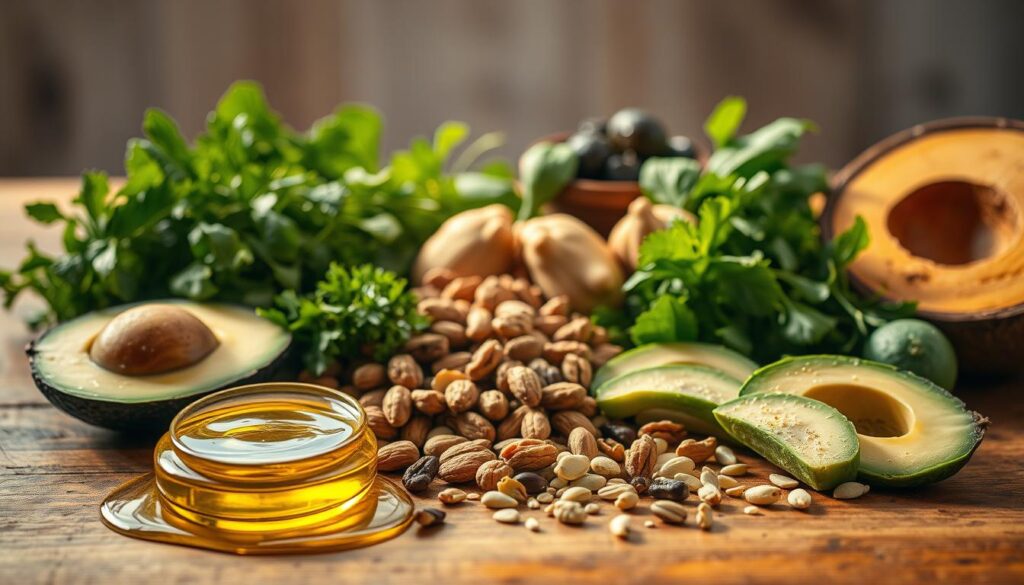
Extra Virgin Olive Oil as a Powerhouse
Extra virgin olive oil is a staple in Mediterranean diets for good reason. It’s rich in oleocanthal, a compound that works similarly to anti-inflammatory medications. Studies show that this oil can reduce markers of inflammation, making it a valuable addition to your daily meals.
I’ve found that using olive oil in salads or as a cooking base enhances both flavor and health benefits. Its monounsaturated fats also support heart health, reducing the risk of heart disease.
Heart-Healthy Avocados
Avocados are another excellent source of healthy fat. They’re packed with monounsaturated fats and antioxidants, which help lower inflammatory markers. Adding avocados to your diet can improve cholesterol levels and support overall cardiovascular health.
I love incorporating avocados into my meals, whether it’s in smoothies, salads, or as a spread. Their creamy texture and nutrient density make them a versatile and delicious choice.
Here’s a quick comparison of these two healthy fats:
| Food | Key Benefit |
|---|---|
| Extra Virgin Olive Oil | Rich in oleocanthal, reduces inflammation. |
| Avocados | High in monounsaturated fats, supports heart health. |
By choosing these healthy fats, you’re taking a proactive step toward better health. Small changes, like swapping out saturated fat for olive oil or adding avocado to your meals, can have a big impact over time.
How to Balance Your Meals for Reduced Inflammation
Balancing your meals with the right mix of nutrients can be a powerful tool in managing inflammation. A well-planned diet ensures you get the essential vitamins, minerals, and compounds your body needs to thrive. Research shows that incorporating a variety of colorful, nutrient-dense options can help control inflammation effectively.
Meal Planning Tips
Start by focusing on whole, unprocessed ingredients. Include plenty of fruit and vegetables, which are rich in antioxidants and fiber. These nutrients help combat oxidative stress and support digestive health.
Here’s a simple guide to building balanced meals:
| Component | Examples |
|---|---|
| Protein | Salmon, lentils, Greek yogurt |
| Healthy Fats | Olive oil, avocado, nuts |
| Complex Carbs | Quinoa, sweet potatoes, whole grains |
Plan your meals ahead to ensure you have the right ingredients on hand. This way, you’re less likely to reach for processed options that can trigger inflammation.
Smart Snacking Options
Snacking doesn’t have to derail your health goals. Choose options that are both satisfying and beneficial. Fresh berries, a handful of nuts, or veggie sticks with hummus are excellent choices.
Here are some anti-inflammatory snack ideas:
- Berries with a sprinkle of chia seeds
- Carrot sticks with guacamole
- Dark chocolate with almonds
These snacks provide a mix of antioxidants, healthy fats, and fiber, helping you stay energized and inflammation-free throughout the day.
“Small changes in your daily eating habits can lead to significant improvements in your overall health.”
By focusing on balanced meals and smart snacking, you’re taking a proactive step toward reducing inflammation and supporting your long-term well-being.
Dietary Patterns to Support an Anti-inflammatory Lifestyle
Adopting the right dietary patterns can significantly impact your health and reduce inflammation. Research shows that certain eating habits, like the Mediterranean and DASH diets, are effective in lowering inflammatory markers. These approaches focus on whole, nutrient-dense ingredients that support your body’s natural healing processes.
⏳ Exclusive Offer Just for You!
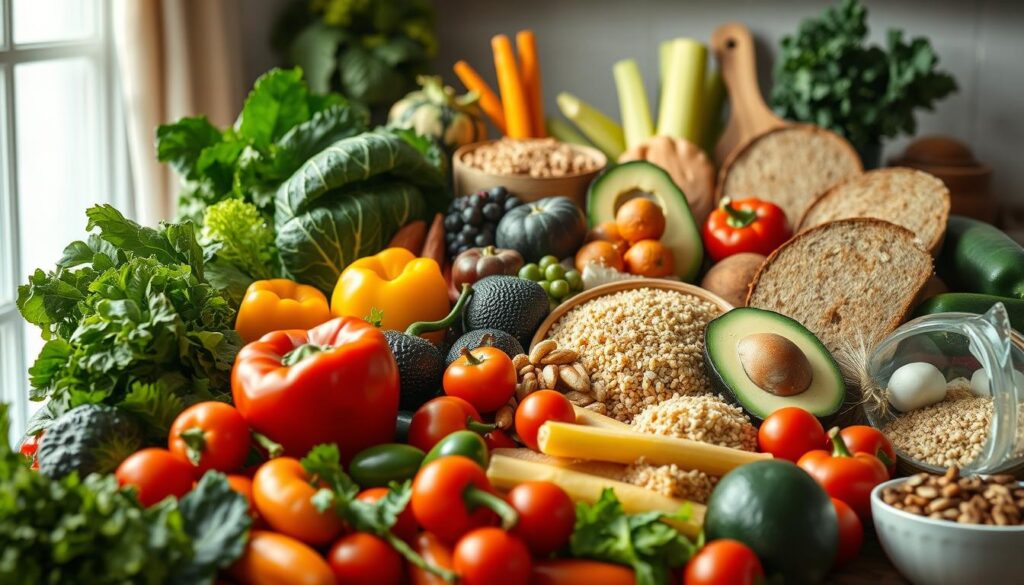
Mediterranean Diet Essentials
The Mediterranean diet emphasizes fruits, vegetables, whole grains, and healthy fats like olive oil. Studies highlight its ability to reduce C-reactive protein, a key marker of inflammation, by up to 20%. This diet is also linked to a lower risk of heart disease and improved overall well-being.
Here’s a breakdown of its core components:
| Component | Benefit |
|---|---|
| Fruits and Vegetables | Rich in antioxidants that combat oxidative stress. |
| Whole Grains | Provide fiber to support digestive health. |
| Olive Oil | Contains oleocanthal, which has anti-inflammatory effects. |
DASH Diet Advantages
The DASH diet focuses on low sodium and high nutrient density, making it ideal for reducing blood pressure and inflammation. It encourages the consumption of lean proteins, fruits, vegetables, and whole grains. Research shows that this approach can lower inflammatory markers and improve cardiovascular health.
Key features of the DASH diet include:
- Low Sodium: Helps manage blood pressure and reduce inflammation.
- High Nutrient Density: Provides essential vitamins and minerals for overall health.
- Lean Proteins: Supports muscle repair and immune function.
Plant-Based Alternatives
Plant-based diets are another effective way to lower chronic inflammation. These diets focus on fruits, vegetables, legumes, and whole grains while minimizing processed foods and meat. Studies show that plant-based eating can reduce the risk of heart disease and diabetes.
Here’s how plant-based diets compare to omnivorous diets:
| Aspect | Plant-Based Diet | Omnivorous Diet |
|---|---|---|
| Inflammatory Markers | Lower levels of CRP and interleukin-6. | Higher levels of inflammatory markers. |
| Heart Disease Risk | Reduced risk due to high fiber and low saturated fat. | Increased risk with higher saturated fat intake. |
Transitioning to these dietary patterns doesn’t have to be overwhelming. Start by incorporating more fruits, vegetables, and whole grains into your meals. Over time, these changes can become habits that support your long-term health.
Practical Ways to Transition to an Anti-inflammatory Diet
Transitioning to a healthier way of eating doesn’t have to be overwhelming. Small, gradual changes can make a big difference in reducing inflammation and improving your overall well-being. I’ve found that focusing on mindful habits and swapping out processed items for whole, nutrient-dense alternatives is key to long-term success.
Gradual Dietary Changes
Start by making one or two simple swaps each week. For example, replace sugary soda with herbal tea or water infused with fresh fruit. Instead of reaching for chips, try snacking on raw nuts or veggie sticks with hummus. These small shifts can help you build healthier habits without feeling deprived.
Another tip is to gradually introduce more whole grain options, like quinoa or brown rice, into your meals. These choices are rich in fiber, which supports digestive health and may help reduce inflammation. Over time, these changes can become second nature.
Mindful Eating Habits
Mindful eating is about paying attention to how your body feels before, during, and after meals. I’ve learned to recognize when I’m eating out of boredom or stress rather than hunger. This awareness helps me make better choices and avoid overeating.
One strategy I use is to slow down and savor each bite. This not only enhances the enjoyment of meals but also gives my body time to signal when it’s full. Avoiding distractions, like TV or phones, during meals can also help you stay present and in tune with your body’s needs.
“Small, consistent changes are more sustainable than drastic overhauls.”
Here are some actionable tips to get started:
- Swap processed food for whole, unprocessed ingredients.
- Choose lean proteins like fish or plant-based options over red meat.
- Limit added sugar by opting for natural sweeteners like fruit.
- Use healthy fats like olive oil instead of saturated fat.
By taking these steps, you’re not just reducing inflammation—you’re building a foundation for better health. Remember, it’s about progress, not perfection.
Conclusion
Making small, intentional changes to your daily meals can lead to lasting improvements in your health. Throughout this article, I’ve highlighted how incorporating a variety of nutrient-rich options can support your body and reduce inflammation. From the benefits of olive oil to the power of whole grains, these choices are backed by science and personal experience.
An anti-inflammatory diet isn’t just about what you eat—it’s about creating habits that promote long-term well-being. Start by swapping processed food for fresh, whole ingredients. Experiment with meal planning and mindful eating to find what works best for you.
I encourage you to take the first step today. Whether it’s adding more leafy greens or trying a Mediterranean-inspired dish, these changes can make a real difference. Your journey to better health begins with the choices you make at every meal.
FAQ
What is the difference between good and chronic inflammation?
How does an anti-inflammatory diet benefit long-term health?
What are some top foods to include in an anti-inflammatory diet?
Why are fruits, vegetables, and whole grains important in this diet?
How do healthy fats like olive oil and avocados help?
What are some tips for balancing meals to reduce inflammation?
How does the Mediterranean diet support an anti-inflammatory lifestyle?
What are some practical ways to transition to an anti-inflammatory diet?
Did you like this article? See also: Effective Weight Loss Supplements: Achieve Your Goals Safely

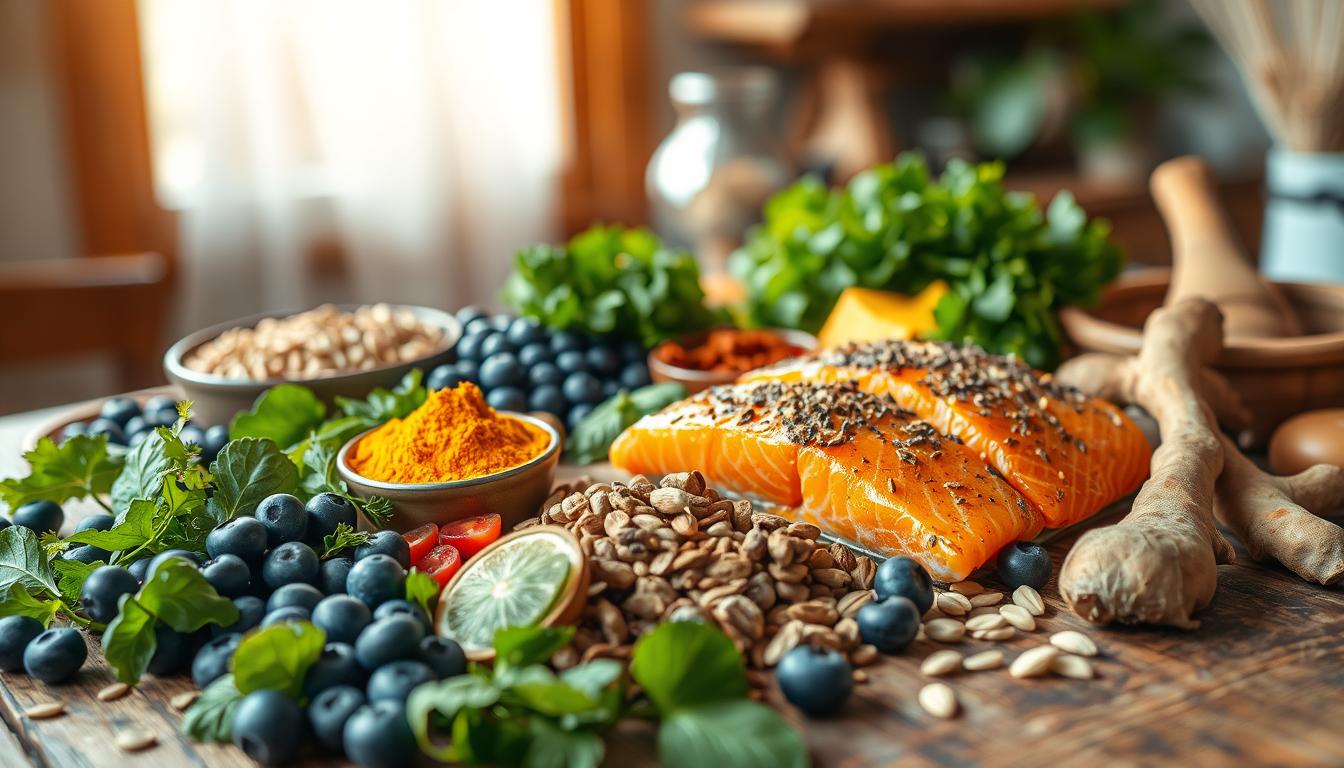
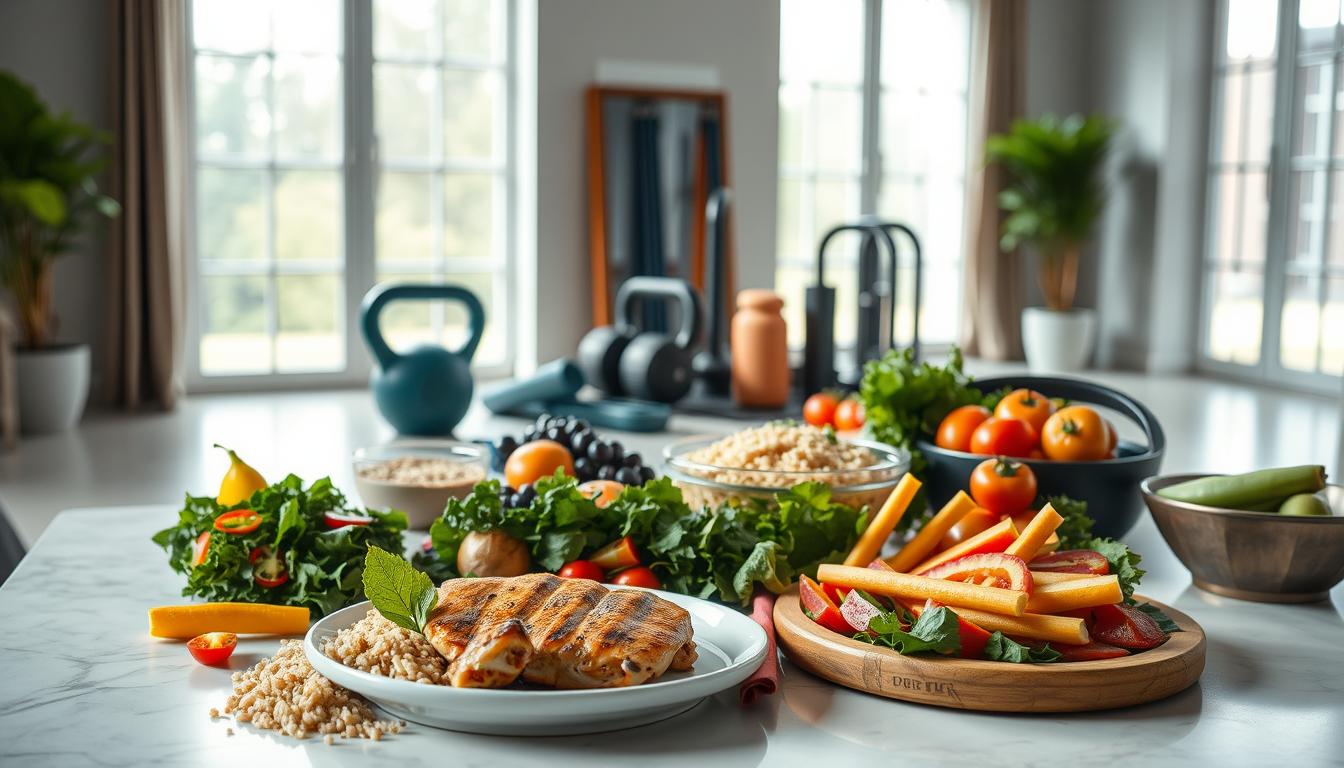



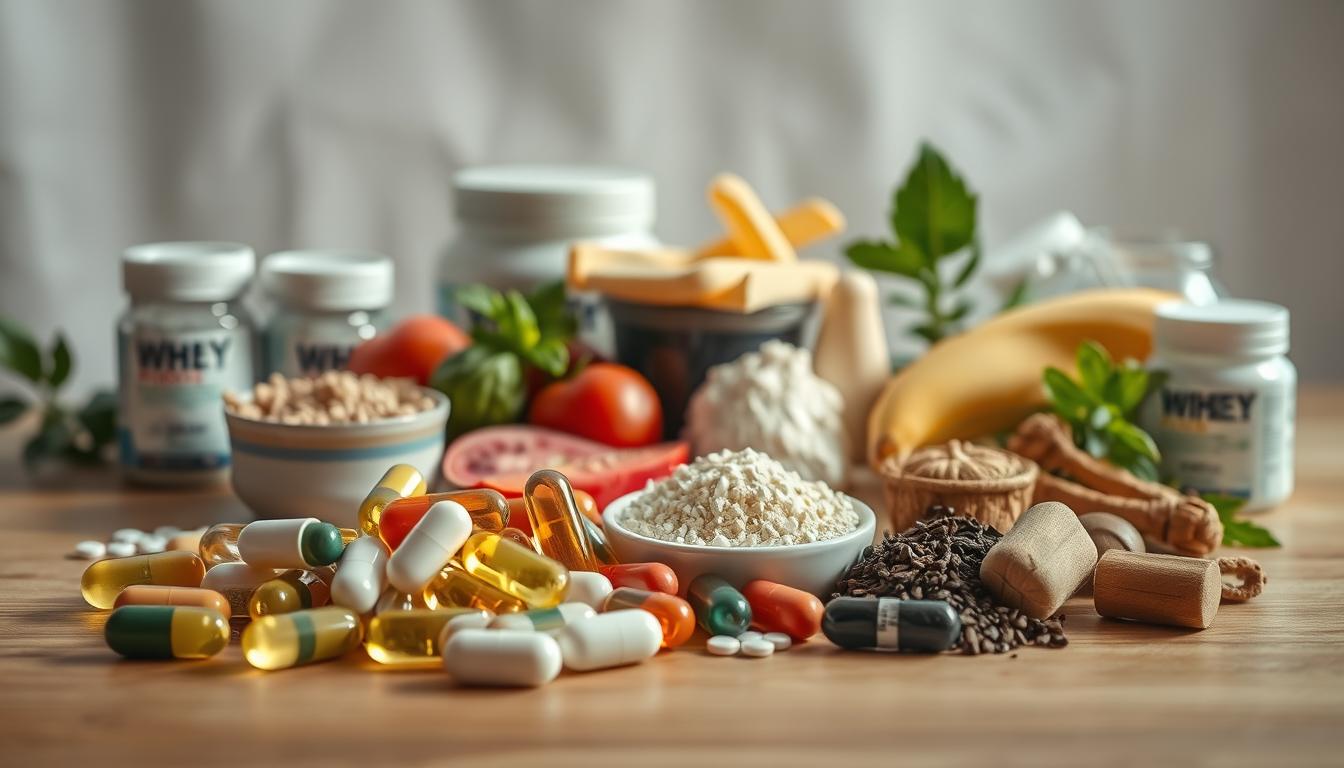
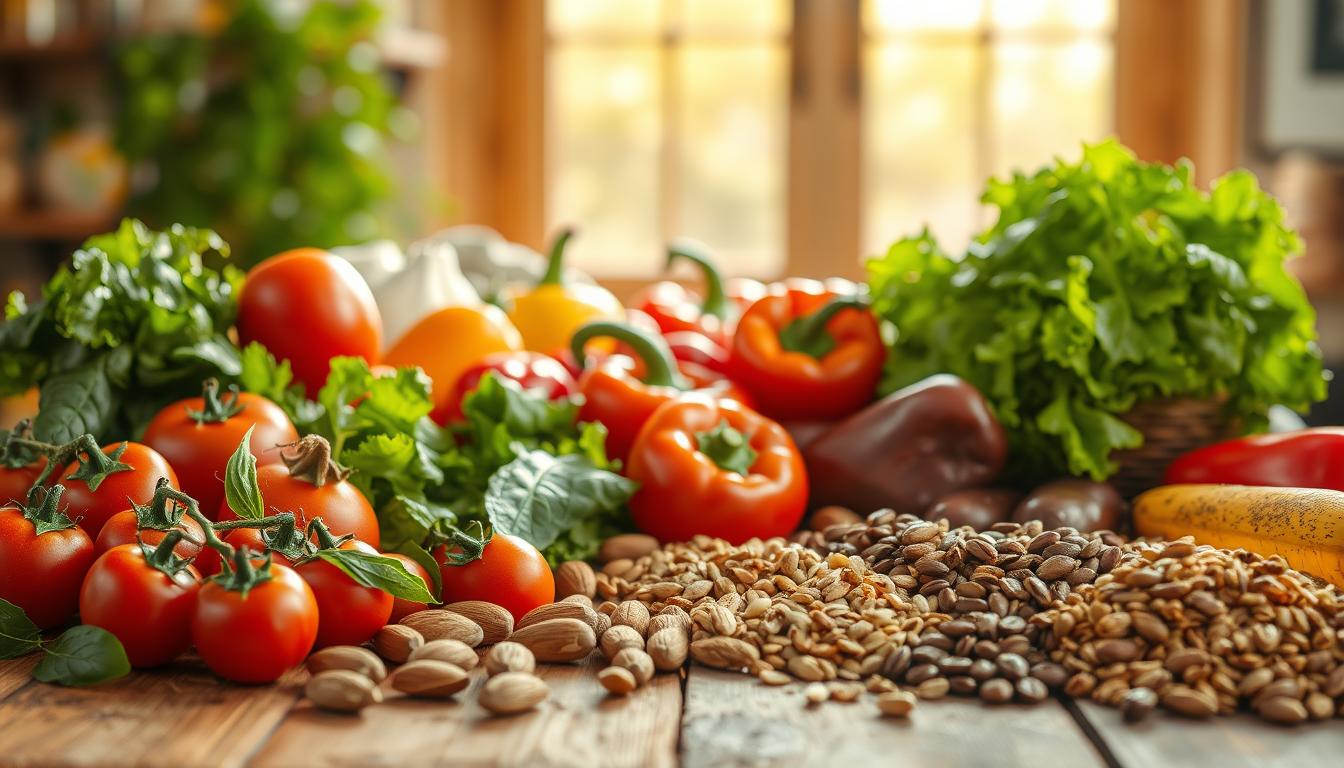
Comment on “Reduce inflammation with anti-inflammatory foods for diet”